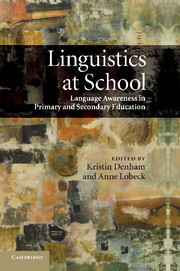Book contents
- Frontmatter
- Contents
- Notes on contributors
- Foreword: The challenge for education
- Introduction
- Part I Linguistics from the top down: encouraging institutional change
- Part II Linguistics from the bottom up: encouraging classroom change
- Part III Vignettes: voices from the classroom
- Introduction to Part III
- 16 And you can all say haboo: enriching the standard language arts curriculum with linguistic analysis
- 17 Code switching: connecting written and spoken language patterns
- 18 A primary teacher's linguistic journey
- 19 Why do VCE English Language?
- 20 Language lessons in an American middle school
- 21 The diary of Opal Whiteley: a literary and linguistic mystery
- 22 Using the Voices of North Carolina curriculum
- 23 A-level English Language teaching in London
- References
- Index
23 - A-level English Language teaching in London
Published online by Cambridge University Press: 04 August 2010
- Frontmatter
- Contents
- Notes on contributors
- Foreword: The challenge for education
- Introduction
- Part I Linguistics from the top down: encouraging institutional change
- Part II Linguistics from the bottom up: encouraging classroom change
- Part III Vignettes: voices from the classroom
- Introduction to Part III
- 16 And you can all say haboo: enriching the standard language arts curriculum with linguistic analysis
- 17 Code switching: connecting written and spoken language patterns
- 18 A primary teacher's linguistic journey
- 19 Why do VCE English Language?
- 20 Language lessons in an American middle school
- 21 The diary of Opal Whiteley: a literary and linguistic mystery
- 22 Using the Voices of North Carolina curriculum
- 23 A-level English Language teaching in London
- References
- Index
Summary
My partner teacher and I teach A-level English Language to about 60–70 students across two classes in each year at St Francis Xavier College. Sixth Form Colleges are part of the English Further Education, post-compulsory sector delivering two year A-level courses to 16–18-year-olds. The A-level since 2000 has been split into a one year AS (Advanced Subsidiary) qualification which can then be followed by an A2 year, the full A-level qualification being achieved by two years of study. We're an inner city London college, taking students from some of the poorest and most deprived areas of south London. The student body is largely black: a mix of Caribbean and West African family backgrounds being the main bulk of this, while we also have a significant intake of students from Portuguese, Pakistani, Chinese and white working class backgrounds (with all the various mixes of Irish, traditional cockney and Jewish influences which that entails).
The mixture of backgrounds and the range of different perspectives our students have is a real benefit to the teaching of the A-level in English Language. Inner city London is – I suppose like any major city – in a permanent state of linguistic flux. Young (and not so young) people are constantly adapting their language use to accommodate new trends in music, fashion and media, marking out ever-shifting boundaries between and within groups of people.
- Type
- Chapter
- Information
- Linguistics at SchoolLanguage Awareness in Primary and Secondary Education, pp. 277 - 281Publisher: Cambridge University PressPrint publication year: 2010
- 1
- Cited by



